DevOps automation tools have become a game-changer in the world of software development, helping bridge the gap between development and operations teams.
These tools make the entire software delivery process faster and more reliable. By combining development, testing, and deployment into a smooth workflow, DevOps fosters collaboration, efficiency, and continuous improvement.
Instead of getting bogged down in repetitive tasks, DevOps automation tools let teams focus on what matters most: innovation.
In traditional environments, delays often happen due to manual handoffs and inconsistent processes. But DevOps changes that by creating a culture of collaboration and integrating automation into every step.
From CI/CD pipelines to configuration management, testing, and monitoring, DevOps automation tools help maintain agility, even as your operations scale.
That said, teams using these tools see faster release cycles, improved efficiency, and a better alignment between business goals and IT capabilities.
In this guide, we’ll take you through 9 essential DevOps automation tools and show you how they can seamlessly fit into your workflow, making your processes smoother and more efficient.
What are DevOps Automation Tools?
DevOps automation tools are software solutions designed to automate and streamline various stages of the DevOps lifecycle, enhancing the collaboration between development, operations, and other stakeholders.
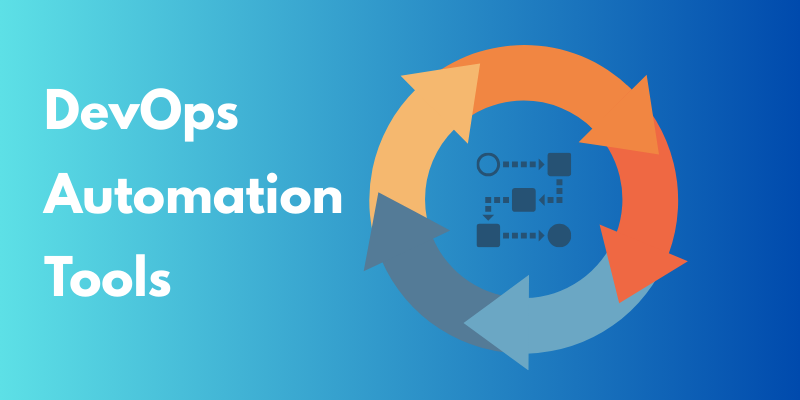
These tools help automate repetitive tasks such as code integration, testing, deployment, monitoring, and configuration management, significantly reducing manual effort, improving productivity, and ensuring a smoother, more consistent workflow.
By leveraging these tools, DevOps teams can focus more on innovation and problem-solving rather than on time-consuming administrative tasks.
The role of DevOps automation tools in DevOps is crucial, as they enable the fast, efficient, and reliable delivery of software. These tools facilitate continuous integration (CI), continuous delivery (CD), and infrastructure as code (IaC), which are foundational to DevOps practices.
By automating key processes, they also help prevent human error, reduce risks, and enhance the speed of delivery, allowing organizations to achieve their goals faster and with better quality software.
Explore Our Web Design & Development Services!
5 Key Types of DevOps Automation Tools
It includes CI/CD tools, configuration management tools, monitoring tools, testing tools, and containerization tools, each streamlining different aspects of the DevOps lifecycle for improved efficiency and collaboration.
To find the best options for your business, you might want to explore services offered by digital marketing agencies or those that specialize in helping you automate your DevOps processes and align them with your business goals.
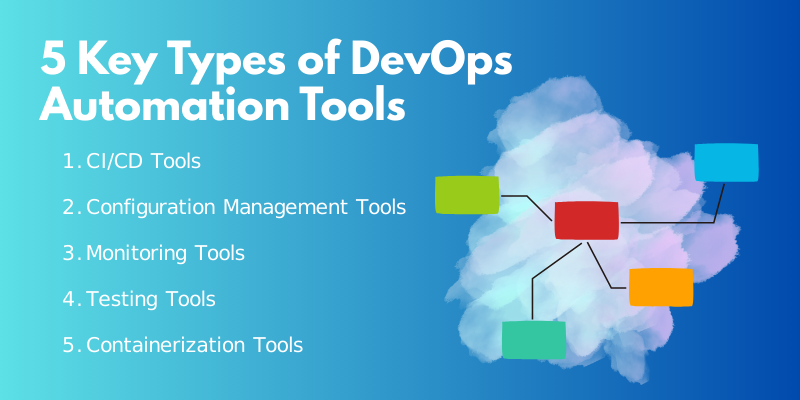
Here are the main key types of DevOps automation tools:
1. CI/CD Tools
These tools enable teams to continuously integrate and deploy code, ensuring faster release cycles and more reliable software delivery.
By automating the build, test, and deployment stages, they help reduce manual intervention, improve collaboration between development and operations teams, and ensure that software changes are tested and deployed smoothly and efficiently.
2. Configuration Management Tools
These tools ensure consistency across environments, eliminating the risk of configuration drift and making it easier to manage large-scale deployments.
By automating the configuration of servers, these tools help reduce errors, speed up the deployment process, and ensure that environments are always correctly configured, whether it's for development, testing, or production. This automation mirrors the best marketing tactics applied in tech-driven fields like SEO and digital marketing.
3. Monitoring Tools
They allow DevOps teams to monitor system performance, identify bottlenecks, and quickly address any issues before they affect end-users. These tools help teams maintain uptime, track key metrics, and visualize data to ensure that systems are operating as expected and that potential issues are flagged early for resolution.
If you're looking for SEO ranking report software or want to track Google keyword ranking, these monitoring tools offer similar benefits for keeping things running smoothly.
4. Testing Tools
These tools enable continuous testing of code changes, helping to identify bugs and issues early in the development cycle. By automating tests, teams can ensure that their code meets quality standards, reduce manual testing effort, and speed up the release process.
Tools like SEO website builders can aid in integrating testing measures with digital marketing platforms, ensuring consistent and optimized results. They also allow for comprehensive testing of both functional and non-functional requirements.
5. Containerization Tools
Docker allows developers to package applications and their dependencies into containers, ensuring that they run consistently across different environments. This approach is similar to how marketing automation tools work, streamlining repetitive processes for teams.
Kubernetes, on the other hand, helps automate the orchestration of these containers, managing their deployment, scaling, and operation in a clustered environment. Together, they enable more efficient use of resources, scalability, and portability of applications.
9 Core Types of DevOps Automation Tools
These tools help streamline processes across CI/CD, configuration management, containerization, monitoring, and testing for faster, more reliable software delivery.
Core Types of DevOps Automation Tools include:
- Jenkins
- GitLab CI
- CircleCI
- Ansible
- Chef
- Grafanat
- Docker
- Selenium
- Prometheus
Let’s explore each.
1. Jenkins (CI/CD Tool)
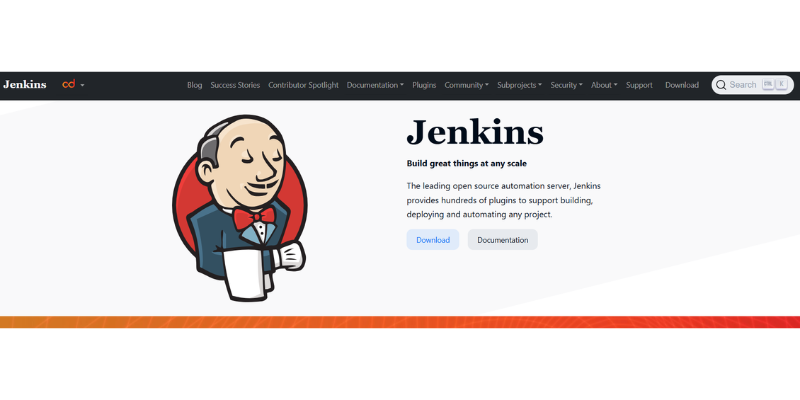
Jenkins is an open-source automation tool used for continuous integration and continuous delivery (CI/CD). It helps automate parts of the software development process, such as building, testing, and deploying code.
With Jenkins, developers can ensure that code changes are automatically tested and deployed, making it easier to detect bugs early, reduce manual intervention, and speed up the delivery pipeline. Jenkins has a vast ecosystem of plugins, allowing it to integrate with various tools and technologies.
2. CircleCI (CI/CD Tool)
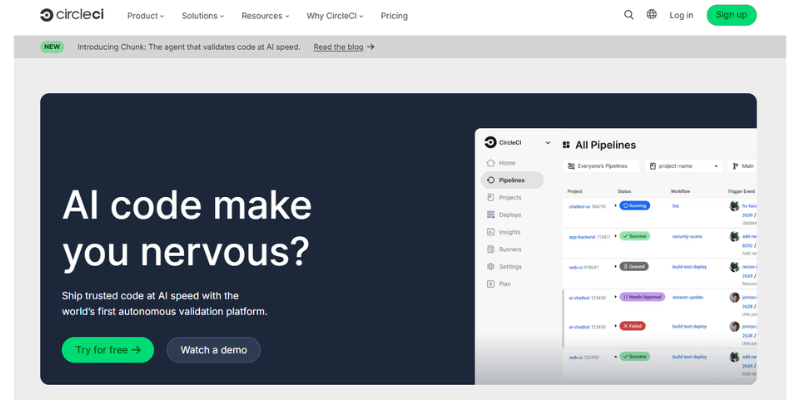
CircleCI is a cloud-based CI/CD platform that automates the software development process, helping teams to continuously integrate and deliver their code. It offers rapid feedback on code changes, ensuring that issues are detected early.
CircleCI integrates with various version control platforms like GitHub and Bitbucket and allows for parallel testing and deployment, speeding up workflows and enhancing team collaboration. Just as seo marketing agencies enhance online presence and brand recognition by automating keyword and content strategies.
3. Ansible (Configuration Management Tool)
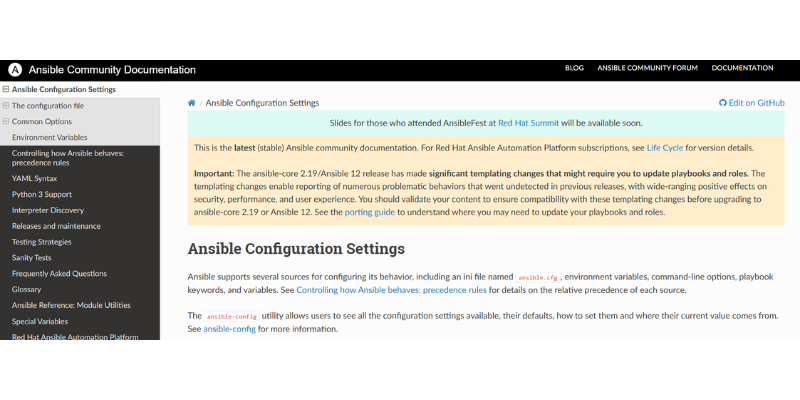
Ansible is an open-source automation tool that simplifies configuration management, application deployment, and task automation. It uses a declarative language to describe system configurations and automates repetitive tasks, ensuring that environments are consistently configured.
Ansible operates agentless, meaning it doesn't require any software to be installed on the target systems, and it leverages SSH for communication.
It's widely used in DevOps for provisioning infrastructure, automating software deployment, and managing configurations across systems.
4. Docker (Containerization Tool)
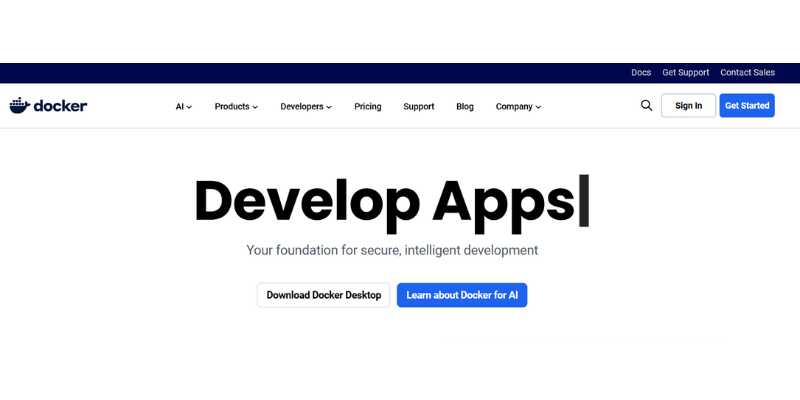
Docker is a platform that enables developers to create, deploy, and run applications inside lightweight, portable containers. Containers package all the necessary dependencies and configurations for an application, ensuring consistency across different environments.
Docker simplifies the deployment process, eliminates the "works on my machine" issue, and enhances scalability by isolating applications from the host system. It has become the de facto standard for containerization and is widely used in DevOps workflows much like affordable local SEO services that streamline a business’s online visibility by improving local search results.
5. Prometheus (Monitoring Tool)
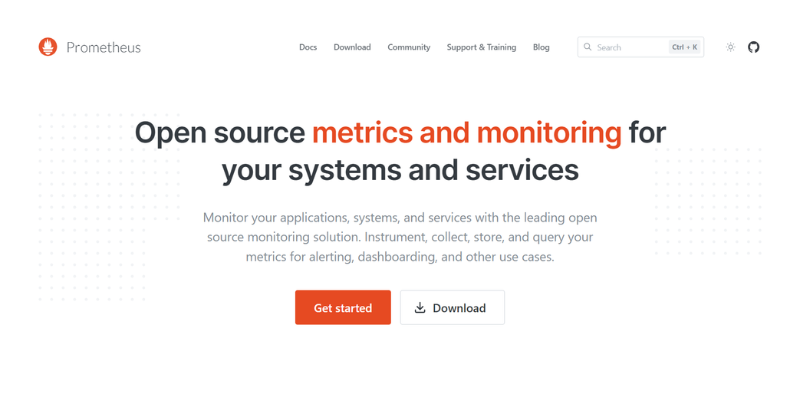
Prometheus is an open-source monitoring and alerting toolkit designed for reliability and scalability. It collects and stores metrics from applications and infrastructure in a time-series database and allows users to query the data for insights into system performance.
Prometheus integrates with Kubernetes and other container orchestration platforms, making it an ideal choice for monitoring cloud-native applications. It also supports alerting, so teams can proactively address performance issues and anomalies before they affect users.
6. Selenium (Testing Tool)
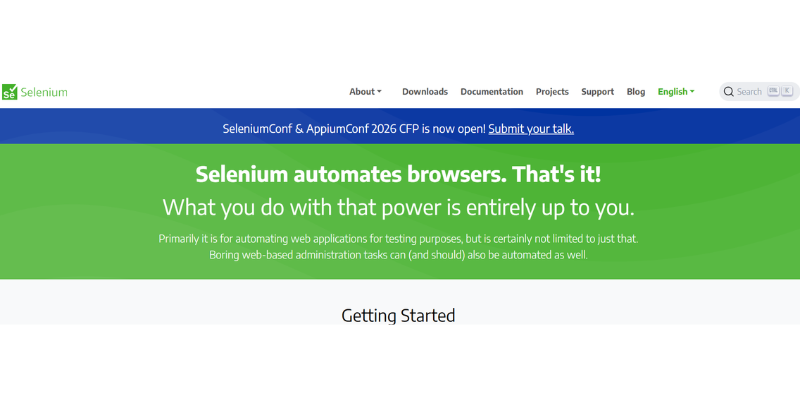
Selenium is a widely used open-source tool for automating web applications across different browsers and platforms.
It is often used for functional testing to simulate user interactions with web pages, such as clicking buttons, filling forms, and navigating through the app.
Selenium supports multiple programming languages like Java, Python, and JavaScript, making it versatile for various testing frameworks. It is highly effective in continuous testing within DevOps pipelines, ensuring high-quality web applications
7. Grafana (Monitoring Tool)
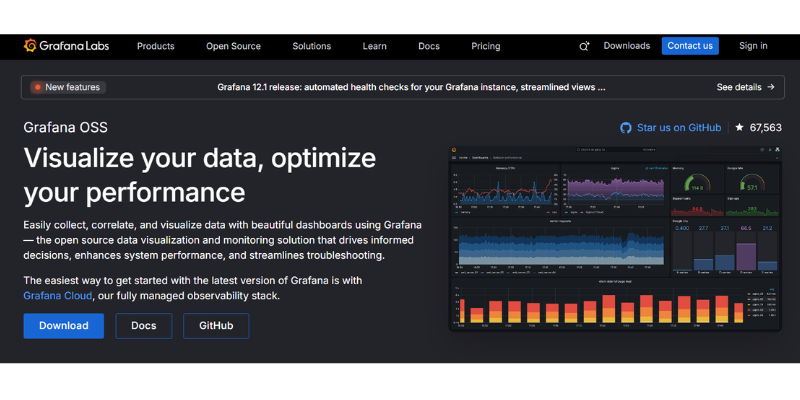
Grafana is an open-source platform for monitoring and observability that integrates with a wide range of data sources, such as Prometheus, InfluxDB, and Elasticsearch.
It provides powerful visualizations through dashboards, helping teams monitor application performance, track system health, and detect issues in real-time.
Grafana’s flexibility allows users to create customized monitoring views, share dashboards, and set up alerts, making it a valuable tool for DevOps teams to maintain system uptime and optimize application performance.
8. GitLab CI (CI/CD Tool)
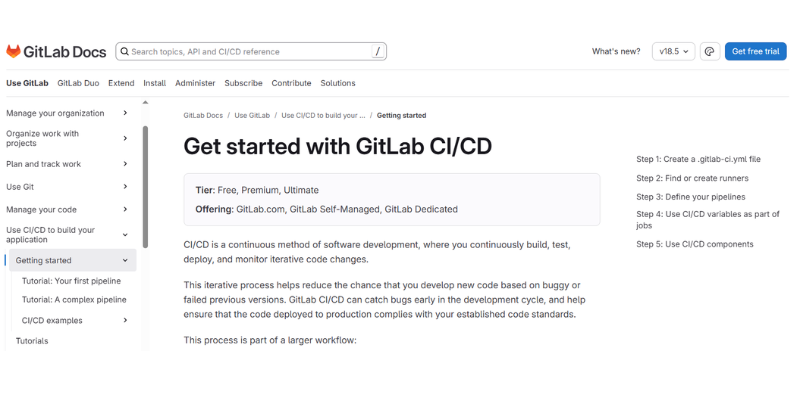
GitLab CI is a powerful continuous integration and delivery platform built into the GitLab repository management system. It enables teams to automate the building, testing, and deployment of their applications directly within the GitLab environment.
GitLab CI integrates seamlessly with Git repositories, allowing developers to trigger pipelines based on code commits, merge requests, or scheduled tasks. It supports parallel jobs, Docker-based containers, and Kubernetes, enabling faster, scalable, and more efficient development workflows.
9. Chef (Configuration Management Tool)
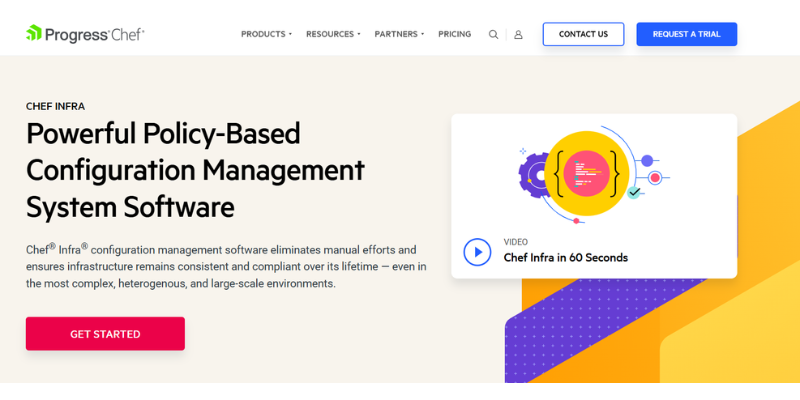
Chef is an open-source automation platform that manages infrastructure as code. It allows DevOps teams to automate the configuration, deployment, and management of systems across a network of servers.
Chef uses a Ruby-based domain-specific language (DSL) to describe system configurations, ensuring that environments are consistently set up across multiple systems.
It is widely used for managing complex infrastructure and automating repetitive tasks, and integrates well with cloud platforms like AWS, Azure, and Google Cloud.
Steps to Integrate Automation Tools into Existing Workflows
It involve assessing current processes, selecting the right tools, integrating with version control, and automating CI/CD pipelines for seamless development and deployment.
Few steps mentioned below:
- Assess Current Workflow: Analyze your existing development and operations workflows to identify areas where automation can add value. You may even need to consider a tech marketing agency like Centric to help assess and integrate automation effectively.
- Select Appropriate Tools: Choose the right DevOps automation tools that fit your team's needs, considering factors like scalability, ease of integration, and the technology stack.
- Integrate with Version Control Systems: Ensure the selected tools integrate seamlessly with version control systems like Git to automate the code integration process.
- Set Up Continuous Integration/Continuous Delivery (CI/CD) Pipelines: Automate the build, test, and deployment stages to enable faster and reliable software delivery.
- Automate Configuration Management: Use configuration management tools like Ansible or Chef to automate server configurations and ensure consistency across environments.
- Implement Monitoring and Testing: Set up tools to automate testing, monitoring, and alerting for system health, performance, and bug detection.
3 Main Challenges in DevOps Automation
It include managing complexity and scalability, integrating with legacy systems, and addressing security concerns and compliance requirements.
Following are the main challenges discussed below:
- Managing Complexity and Scalability: As DevOps tools scale with increasing workloads, managing complex workflows, configurations, and infrastructure becomes challenging, requiring careful planning and orchestration. For organizations undergoing digital transformation services or performance marketing service scalability is often one of the biggest hurdles.
- Integration with Legacy Systems: Integrating automation tools with legacy systems that may not support modern DevOps practices or technologies can create compatibility issues and hinder seamless automation.
- Security Concerns and Compliance: Automating processes introduces potential security risks, especially when sensitive data is involved, and ensuring compliance with industry regulations requires extra precautions during tool integration and usage.
FAQs: Devops Automation Tools
What are the best DevOps automation tools for small teams?
For small teams, tools like Jenkins, GitLab CI, and CircleCI are ideal due to their ease of use, scalability, and integration capabilities, offering robust CI/CD pipelines without high costs. This approach is also seen in how seo services for ecommerce provide cost-effective optimization to help small businesses boost their online stores.
How can DevOps automation improve team collaboration?
DevOps automation fosters better collaboration by streamlining workflows, enabling real-time updates, and providing transparency across teams, ensuring everyone is aligned on deployments, testing, and infrastructure management.
What is the cost of implementing DevOps automation tools?
The cost of implementing DevOps automation tools varies depending on the tools chosen, the scale of the project, and infrastructure needs. Open-source tools like Jenkins are free, while enterprise-level tools may incur licensing and support fees.
Can DevOps automation be integrated with existing tools?
Yes, most DevOps automation tools are designed to integrate with existing tools such as version control systems, cloud platforms, and containerization tools, ensuring smooth transitions and continuity in workflows.
How do DevOps automation tools help in reducing errors and downtime?
By automating repetitive tasks like testing, deployment, and monitoring, DevOps automation tools help identify issues earlier in the development cycle, reducing human errors and preventing downtime from unanticipated failures during production. Much like the AI call center future concepts, these tools anticipate potential issues before they cause disruption.
Conclusion
DevOps automation tools bring significant benefits, including faster software delivery, improved collaboration, reduced manual errors, and enhanced system reliability.
These tools streamline the development lifecycle, allowing teams to focus on innovation rather than repetitive tasks.
As the industry evolves, the future of DevOps automation will see even more advanced AI-driven tools, greater integration with machine learning, and the continued push for more efficient and scalable automation solutions.









